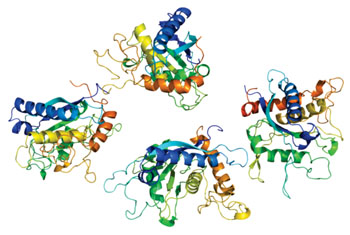Cancer Development: A Molecular Pathway Controls ErbB Signaling via PACS-2 Regulation of Recycling of the Metalloproteinase ADAM17
By LabMedica International staff writers
Posted on 14 Jul 2015
Some types of cancer are triggered by excessive ErbB signaling, and researchers have now discovered a molecular pathway that regulates this process.Posted on 14 Jul 2015
The ErbB family of proteins contains four receptor tyrosine kinases, structurally related to the epidermal growth factor receptor (EGFR), its first discovered member. In humans, the family includes Her1 (EGFR, ErbB1), Her2 (Neu, ErbB2), Her3 (ErbB3), and Her4 (ErbB4). Insufficient ErbB signaling in humans is associated with the development of neurodegenerative diseases, such as multiple sclerosis and Alzheimer's disease, while excessive ErbB signaling is associated with the development of a wide variety of types of solid tumor. ErbB-1 and ErbB-2 are found in many human cancers, and their excessive signaling may be critical factors in the development and malignancy of these tumors.

Image: Structure of the ADAM17 protein (Photo courtesy of Wikimedia Commons).
Investigators at the University of Copenhagen (Denmark) were interested in how the metalloproteinase ADAM17 (ADAM metallopeptidase domain 17) activated ErbB signaling by releasing ligands from the cell surface, a key step underlying epithelial development, growth, and tumor progression.
"ADAM17 is very important to the growth of cancer tumors. It functions as a molecular pair of scissors, separating molecules from the cell's surface which then increases cell growth. The problem being that in cancer cells this growth is over-activated and so the cancer tumor grows rapidly and uncontrollably," said first author Dr. Sarah Dombernowsky, a post-doctoral researcher in the department of biomedicine at the University of Copenhagen.
Using a functional genome-wide siRNA (short interfering RNA) screen, the investigators identified the sorting protein PACS-2 (phosphofurin acidic cluster sorting protein 2) as a regulator of ADAM17 trafficking and ErbB signaling. PACS-2 is a multifunctional sorting protein that controls endoplasmic reticulum (ER)-mitochondria communication. It may also be involved in ion channel trafficking, directing acidic cluster-containing ion channels to distinct subcellular compartments.
PACS-2 loss reduced ADAM17 cell-surface levels and ADAM17-dependent ErbB ligand shedding, without apparent effects on related proteases. PACS-2 co-localized with ADAM17 on early endosomes, and PACS-2 knockdown decreased the recycling and stability of internalized ADAM17. Therefore, PACS-2 sustained ADAM17 cell-surface activity by diverting ADAM17 away from degradative pathways.
"We have discovered that the protein PACS-2 plays a big part in the transportation of ADAM17 in cells," said Dr. Dombernowsky. "ADAM17 moves in and out of the cell, but it has to remain on the surface to be able to cut off molecules and thus further growth. We have showed that without the PACS-2, ADAM17 returns less regularly to the surface; it is broken down instead. We are currently experimenting on mice to see if the cancer growth slows down, and it is our distinct expectation that it will. In the long-term, we would like to develop something that through PACS-2 allows us to fine-tune ADAM17, which could then eventually become part of a more targeted cancer treatment."
The study was published in the June 25, 2015, online edition of the journal Nature Communications.
Related Links:
University of Copenhagen













